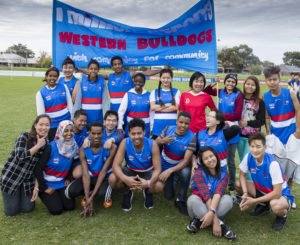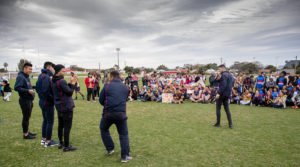Diversity drives the Dogs
Take a drive through Footscray or a dozen other western Melbourne suburbs this week and you’ll see an astonishing sight.
The power poles and public buildings are all decked out in red, white and blue – the colours of the Western Bulldogs AFL club who this week play in their first Grand Final since 1961. Nothing surprising there.
But also decorated in the colours of the club – affectionately known as ‘the scraggers’ because of their working class antecedents – are Vietnamese restaurants, African cafes and Indian grocery stores.
This multicultural display of loyalty is part of an extraordinary outpouring of community support for the Bulldogs that is due in no small part to the club’s recognition that its natural catchment area for fans is one of the most culturally diverse regions in Australia.
 Settlement agency AMES Australia works closely with the Western Bulldogs in delivering settlement services to newly arrived migrants, refugees and asylum seekers – many who live in Melbourne’s west.
Settlement agency AMES Australia works closely with the Western Bulldogs in delivering settlement services to newly arrived migrants, refugees and asylum seekers – many who live in Melbourne’s west.
AMES Australia’s Senior Manager working in the west Dr Tess Demediuk said it was thrilling to see the Bulldogs on the verge of history.
“The Bulldogs are wonderful partners for some of our programs and they realise the importance of inclusion when it comes to emerging communities and newcomers to Australia,” Tess said.
“I think that’s why they are receiving so much support from communities across the west,” she said.
The Bulldogs’ home ground, The Whitten Oval, plays host to the annual CALDplay Football Carnival held in conjunction with AMES Australia and as part of Refugee Week, in which men and women from many different cultural backgrounds learn about AFL and compete in matches.
This year, more than 200 young people from almost 30 countries took part in the event.
Dr Demediuk says the event shows the Western Bulldogs commitment to their community and its diverse nature is more than just a publicity exercise.
“When the players themselves come out and take part in helping our students learn about the game and about Australian society and culture, it shows they really care,” she said.
The club has become an integral part of the local community because it understands that community and embraces it.
Bulldogs star Jason Johannisen, himself a migrant from South Africa, said contributing to multiculturalism a mutual understanding was personally important.
“Sport was such a big thing for me when I moved to Australia, and it’s great to see that AFL football is having a similar impact for people here in Melbourne’s west,” Mr Johannisen said.
Bulldogs Community Development Officer Gavin Ackerly says the club sees it future as part of Melbourne’s diverse, multicultural west.
He said that embracing emerging communities could mean more memberships into the future but also had a moral dimension.
“In the west of Melbourne we have a fast growing diverse place – and we need to recognise and embrace that because we see our future as part of that diversity,” Mr Ackerly said.
 He said the AFL had the potential to be a force for good if it wanted to be.
He said the AFL had the potential to be a force for good if it wanted to be.
“When we see racism called out on a football pitch it has an impact. When the AFL as a community says ‘this is not good enough; it’s an important message,” Mr Ackerly said.
“At our club we have been interested in diversity for a long time – and things are changing as other clubs are realising its importance,” he said.
AMES Australia CEO Cath Scarth said that sport, and particularly AFL in Melbourne, could be a powerful tool in helping new arrivals to Australia understand and to build connections into the broader Australian society.
“They say that footy is the social glue that binds Melbourne together so we see partnerships like the one with the Bulldogs as a way of promoting a cohesive society and giving newly arrived people connections into the communities in which they now live,” Ms Scarth said.
“Sport is a great way of meeting new people and it is an important part of Australia’s cultural life; so it is very rewarding for us to be able to expose migrants and refugees who are newly arrived to an important facet of life in Australia,” she said.
“Whatever the result on Saturday, the Doggies are already champions in terms of their engagement with, and support for, people who are new to this country,” Ms Scarth said.
Laurie Nowell
AMES Australia Senior Journalist













